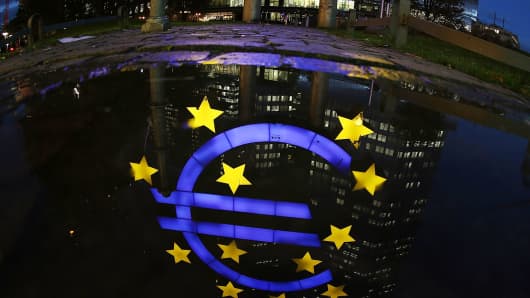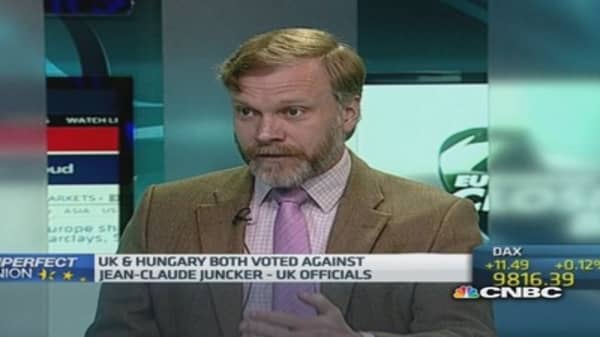Germany's taskmasters keep thrashing the euro area's loose wingers because the disciplined German game is fully supported by an unbeatable partner.
Last week's session of the European Council (a forum of EU heads of state and governments) was another match of clashing visions and statecraft.
No, the European leaders did not clash about the choice of the next EU Commission president. As I wrote in an earlier column, Mr. Juncker's appointment was a certainty once – as the tradition goes – the French and Germans agreed that he was their candidate. All the rest was background noise and political theater.
Read MoreEU leaders choose Juncker, despite UK opposition
And so was the question of Ukraine and the relationship with Russia. Here again, it was largely the French-German approach that dominated the proceedings. These two countries have taken the lead in setting up the EU ties with the post-Soviet space and in managing matters of European security.
The media-inspired brouhaha surrounding Mr. Juncker and Ukraine obscured the only substantive and existential issue on the Council's agenda: The loosening of the fiscal discipline to support the euro area's worryingly slow economic recovery.
The protagonists in this clash were France and Italy on the side of "flexibilists" and, you guessed it, Germany acting as an unmovable object and fighting from the "disciplinarians" corner.
"Gee, I thought we could"
And here is the political dynamite: With high and apparently worsening unemployment, a stagnant economy, declining electoral support along the entire spectrum from far-right to far-left and record-low approval ratings, the French government desperately needed a like-minded ally to confront the Germans.
Read MoreEU data roaming charges slashed by half
Italy was the natural choice because the country's young prime minister is still riding on a wave of great expectations to rescue a recessionary economy with an unemployment rate of 12.6 percent. At the moment, Mr. Renzi has no credible political opponents, but he is finding out that Italy's economic and political problems are much harder to solve than he thought.
As a result, the goalposts are being moved. The proverbial 100 days are no longer enough to show what he can do. Saying that he now needs 1,000 days to deliver on his promises, Mr. Renzi is beginning to sound like the spoof on the American Daily Comedy Show parodying another famous politician: "Gee, I thought we could."
That is the political background to the French-Italian attempt to (a) loosen up their increasingly uncomfortable fiscal adjustment programs, (b) postpone the deadlines for their budget deficit and national debt targets, and (c) use EU funds to finance infrastructure projects.
Read MoreEurope needs single energy market: Enel CEO
Germany would have none of that. Its finance minister quashed the Italian position well before the Council's meeting. He warned that budget agreements that Italy passed with the EU Commission (as part of the "fiscal compact") "must be respected in full – no more, no less."
Where does this leave France? Interestingly, the French game in this Franco-Italian double act is much more intriguing. President Hollande seems to have used Mr. Renzi's readiness to confront Germany while at the same time advocating a more "evolutionary" approach to euro area's growth policies.
Markets may remind France and Italy who is the boss
But Germany's Chancellor Merkel won't be fooled. She knows that Mr. Hollande has strongly disagreed with her fiscal discipline ever since he came to power in May 2012. She also knows that he is in dire straits. The French economy was virtually in recession in the first quarter, and its unemployment is reported to have hit another record-high last week.
Read MoreThis is the next target in UK's reform fight with EU
To make things worse, lurking in the background of all this is a nasty bit of irritation and mistrust as Mr. Hollande keeps trying to enlist Chancellor Merkel's minority coalition partners (the German Socialist Party – SPD) to promote euro area policies she opposes.
Germany's leader may be disappointed that the crucially important French-German tandem is not pulling in the same direction, but she is confident that her much more powerful partner – the financial markets – are completely on her side.





